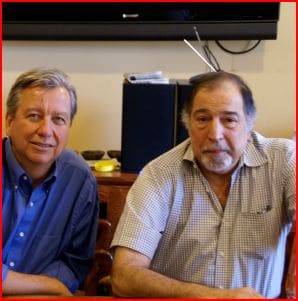
(By Eric Rhoads) Since learning of Dick Orkin’s passing on Christmas Eve, I’ve been thinking a lot about this old friend and mentor and what I learned from him.
I was first exposed to Dick Orkin’s voice when listening to the Chickenman series on WOWO in my hometown of Fort Wayne, Indiana, during my youth. Though that was my parents’ and grandparents’ station, I tuned in for Chickenman every day because I didn’t want to miss an episode. The same became true for The Secret Adventures of the Tooth Fairy.
It was Dick Orkin’s voice I wanted to have when I was a young radio star in training. He had become an icon, a god in the world of radio, and it was my dream to one day meet him.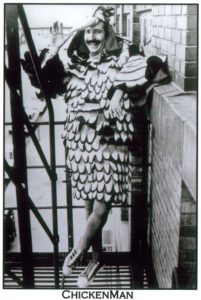
One day, two friends and I were sitting around on a burning summer afternoon when we decided we needed to go to Chicago to hang out there for a day. Me, Charlie Willer, and John Garrett made the drive to South Bend the next morning before sunrise to catch the South Shore train to Chicago. We were all radio geeks and thought maybe we could talk our way in to see “Super CFL” or WLS, the iconic stations we loved from Chicago.
Of course, we weren’t smart enough to make appointments in advance, yet upon arrival we managed to get into WCFL. I remember Paul Kirby was the program director. He showed these three young radio geeks around, and we even got to watch him voice a promo for “The Last Contest,” which was the big event in radio at the time. We even got to see Larry Lujack through the glass, and I think he came out and introduced himself. I know I met him at some point.
After that, we went to the Oak Street studios and talked our way in to meet a production guy, who let us watch the world famous Dick Orkin voice an ad. Orkin then came in, introduced himself, and actually spent time with us. We were blown away that we’d met such a big radio star. He was very generous with his time.
We were on a high and decided to go to the McDonald’s in Water Tower Place for lunch. My friend John had invited a friend of his cousin’s he’d met, a nanny from Germany, who joined us for fish sandwiches. I instantly fell in love and became more enamored as she spent the rest of the day with us doing geeky things like visiting camera stores. I married her a couple of years later.
Needless to say, that random day in Chicago changed my life. Though the marriage did not last more than 12 years, my friendship with Dick Orkin lasted well over 40 years.
I encountered Dick at industry events and was surprised that he remembered me — even the first time we met, many years later, after our visit on Oak Street. He was always interested in learning from me — something I found curious, because I didn’t think I had anything to offer.
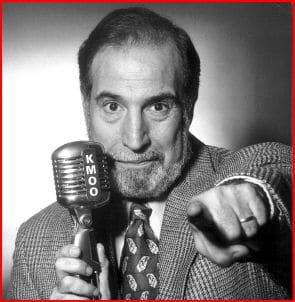 He was driven to help radio get better at making good creative. He was driven by the need to help train production directors, copywriters, and even salespeople on the value of great creative. He would teach at industry events, and even took the training on the road at one point. Of course, he and his brother Sandy built a company doing radio creative together, along with then-partner Bert Berdis. Orkin and Berdis had become known as Dick and Bert and eventually moved to Hollywood, and even had segments on the short-lived America Alive and Tim Conway Show on TV. The relationship with Berdis also ended. Though Dick would never say an unkind word, I could see anger in his eyes when he spoke about it.
He was driven to help radio get better at making good creative. He was driven by the need to help train production directors, copywriters, and even salespeople on the value of great creative. He would teach at industry events, and even took the training on the road at one point. Of course, he and his brother Sandy built a company doing radio creative together, along with then-partner Bert Berdis. Orkin and Berdis had become known as Dick and Bert and eventually moved to Hollywood, and even had segments on the short-lived America Alive and Tim Conway Show on TV. The relationship with Berdis also ended. Though Dick would never say an unkind word, I could see anger in his eyes when he spoke about it.
Dick was giving and generous. He wanted to help me succeed with the launch of Radio Ink many years into our friendship and helped me sell subscriptions by creating an audio story that led people to subscribe to the magazine. It was several minutes long, and very funny. Dick suggested we send them out on sound sheets, which were very thin records you could mail or bind into a magazine — it was cutting-edge at the time. We ended up sending out thousands of cassettes with the message, and subscriptions started coming in droves. It taught me the power of great creative and how it can sell products.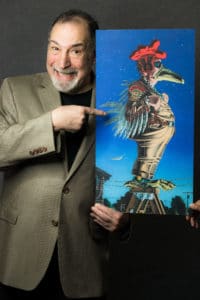
Dick and I didn’t see a lot of each other over the years, but I remember one day having lunch with him at his favorite deli and his telling me about this thing called the Internet, and that it was a huge opportunity I needed to jump all over. I didn’t have the vision or understanding that he had, but over the years I found that he was always on the leading edge of technology; he once told me that if you were going to be in business, you had to stay ahead of the curve and embrace what is coming before everyone else does. Because of that day, I started what became known as the Radio Ink Internet Conference. At the time there were fewer than six stations with websites; by a few weeks after the conference, about 600 were online.
Another day at the deli I told Dick that I had taken up painting as a hobby, and that I had seen a certain type of painting that I wanted to do, but I didn’t know what it was called or how to do it. He told me he thought he knew and took me to a local bookstore and bought me two books. He had nailed it. It was at that moment I learned about “plein air” — outdoor — painting, which I started doing at his urging. That resulted in my starting an art magazine about the subject, which to this day is the number one-selling art magazine in America. His advice resulted in my starting an entire art business in addition to the radio business.
Dick was dead serious about everything he did, yet he was silly and fun and goofy. He would get these giant grins on his face, and he approached life with a big smile and a sense of humor. He would find humor in everything.
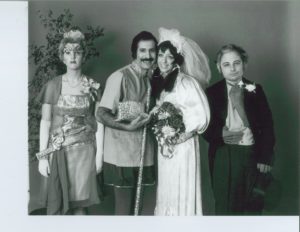 I was with him soon after the passing of his wife, Bunny, and he was heartbroken, yet he managed to look for humor in life in spite of that. After all, it was humor and storytelling his career was built on. I’m sure he wasn’t feeling much joy at the time, yet he was a pro and managed to get through it. Later he met and married the wife of a friend who had passed. They’d found they had a lot in common, and they healed together.
I was with him soon after the passing of his wife, Bunny, and he was heartbroken, yet he managed to look for humor in life in spite of that. After all, it was humor and storytelling his career was built on. I’m sure he wasn’t feeling much joy at the time, yet he was a pro and managed to get through it. Later he met and married the wife of a friend who had passed. They’d found they had a lot in common, and they healed together.
Dick and I saw each other about once a year, because he started coming to the convention I created for plein air painters. He’d decided to paint and wanted to come to school to learn. He attacked it with vigor, attending every session and taking notes. He would tell me what he had learned at the end of each convention and then went home and practiced it. He never showed me what he was painting, but I’m hoping to see one of his paintings someday. What was fabulous is that he had found something else to bring him joy and challenge. I even had him announcing on stage and from the booth at a couple of conventions, and I am happy that I acknowledged him publicly, letting people know they would not be there together had it not been for Dick introducing me to plein air painting.
Last year when I saw him at the convention, Dick looked a little weary, but when I asked him about his health, he had nothing but positive things to say and cracked a couple of jokes. I’m not sure what he was dealing with, but it may have been what led to his death this week.
Dick was passionate about radio creative and was distraught about the state of it today, with salespeople writing copy, production teams cranking out multiple spots a day without much thought, and the lack of importance creative has in the minds of most radio operators. Dick and his team, including his brother and Christine Coyle, moved millions of products for hundreds of companies and proved that great creative works, so the best way to honor him would be to focus on being more creative yourself. And the RAB should create a Dick Orkin Creative category for the Radio Mercury Awards, which he supported and loved.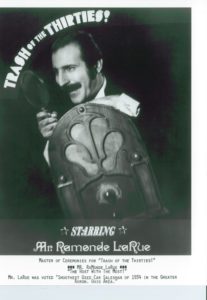
Dick taught me about excellence. Study and learn about your craft and be the very best you can be. Stay on the cutting edge and adopt the new. He was the consummate professional who worked hard at staying relevant and on top of his craft.
He taught me about the importance of humor, of laughing at yourself and not taking yourself too seriously, and sometimes just being silly. (I need to work harder on this.)
He and my mentors Wayne Cornils and Dwight Case taught me the importance of embracing younger people and helping them succeed. All three took time for me at early stages of my career when I had nothing to offer them in return. I need to work harder on this too.
Most importantly, Dick taught me the importance of lifetime curiosity and learning. He was curious about everything, not just his own areas of expertise. He wanted to continually learn and grow. From observation, I know he was doing this even in the final years of his life.
Though one of the great voices of radio has been silenced, his memory and his impact on the radio industry and on consumers will live on. Few men can be called great, yet Dick Orkin was a great man who changed an industry, entertained our listeners and kept them on the edge of their seats and coming back daily, and worked hard to give back and make the industry better. And anyone over 50 will remember him as Chickenman, who made millions laugh every day.
Though I’m sad to see Dick leave us, I have to try to laugh, because that’s what he would have wanted. He devoted his life to making us laugh.
Rest in peace, my friend. Your life was well lived.
Eric Rhoads is the Chairman of Radio Ink and can be reached at [email protected]








Eric , nice tribute to one of the radio greats .
I lived at 2 East Oak when I was at Super CFL and occasionally would be on the elevator when Dick & Bert we’re spitballing ideas and bits ( it was like a Newhart episode) it was hilarious to everyone on the ride up .Years later when I was doing promo work at NBC 2000 and FOX Area 21 I met Bert at his studio on a job and we chatted about Chicago media humor then in 1994 I accidentally met Dick in Toluca Lake walking my dog one evening we must have talked about an hour on everything from Chicago radio to ISDN and my new website.
You hit the nail on the head , he was so curious and open to “ What if “ and “ Why not ?”
We all have learned how to be better talents and people because of Dick Orkin .
Eric, that’s a beautiful tribute. I know my dad treasured his friendship with you.
Great article Eric. You’ve challenged me to think about how I can spend more time encouraging folks to focus on the quality of their work and to pursue creative excellence that can ‘move the needle’. Additionally, you’ve reminded me why we got into this business in the first place…and through the years- whether its been as an on-air talent or in management…the key is to make it fun..not just for us…but for the people we work with.
Brilliant piece about a brilliant man Eric. Well done! Thank you for sharing.
Great eulogy for a great guy. Dick has not passed on, “He’s everywhere! He’s everywhere!”
Eric,
Thanks for putting into words what so many of us feel. Dick has influenced so many of us. I only met him in person a couple of times, but his work has influenced me for decades. Occasionally he’d send an email, complimenting me on one of my articles. A nice gesture from him, a huge thrill for me.
Many of my clients’ radio success stories are the result of what I learned, and continue to learn from a man who inspired a nation to fall in love with a superhero dressed up as a chicken. Fly on oh great White Winged Warrior!
Jeffrey Hedquist
Eric:
You captured Dick Orkin in a tribute like no one else could have done. He would be honored and humbled.
One of my great opportunities in Radio was the day NAB inducted Dick in to the NAB Broadcasting Hall oF Fame. One of the funniest and most creative acceptance responses ever. He’ll long be remembered.
Thank you for spending the time to pay tribute to his legacy.
Here is his (National Radio Hall of Fame ) acceptance speech in Chicago. Also funny.
https://www.youtube.com/watch?v=YdbGYGR7vN4
Here in Canada we would wait avidly for each new award reel so we good hear the latest Dick Orkin masterpieces. My personal favourites include the campaigns he did for TIME, K-Mart, Dayton’s and Junior Mints. Yes he was born with a voice that made you laugh, but he didn’t settle for that. He always aimed higher, to be the best, and although I didn’t know him personally I will always miss him.
Larry MacInnis
Eric,
Great article about Dick Orkin. I worked in Chicago at WIND at the time and only bumped into
Dick a couple of times.
Did not know you were from Ft. Wayne. I was at WOWO from 1968-1973.
Regards,
Stu Collins